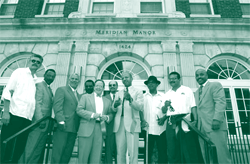April 2009
In this Issue
New Housing on the Horizon
Residential Communities by Design
Limited-Equity Cooperative Creates Affordable Housing in DC
HUD Pursues Energy Efficiency Nationwide
In the next issue of ResearchWorks
Limited-Equity Cooperative Creates Affordable Housing in DC
Determined residents, complex financing, and a unique ownership model have created new affordable housing for 34 low- and very-low-income families in Washington, DC.

Located in the Columbia Heights neighborhood of Northwest Washington, Meridian Manor's metamorphosis over a span of 11 years involved residents, a law clinic, two nonprofits, and placement on the National Register of Historic Places.
The story of Meridian Manor began in 1991, when the tenants sued the building's owner over numerous building code violations. Two years later, the tenants won a $1 million judgment, and in 1994, the residents formed the Archbishop Rivera y Damas Cooperative. With the assistance of the Harrison Institute, a law clinic associated with Georgetown University, the Cooperative negotiated with the building owner and received title to the building in lieu of a monetary award. The Cooperative raised money through bake sales, dinners, and other activities to pay for building repairs. A 1996 fire caused the building to be condemned and forced the tenants to find new homes. Although the tenants were dispersed throughout the city, they continued to work as a group to raise funds for Meridian Manor’s renovation.
In 2000, the Cooperative began working with Mi Casa, a District of Columbia nonprofit that offers development consulting services to commercial and tenant organizations, and provides affordable homeownership opportunities to low- and moderate-income people. The Cooperative and Mi Casa then partnered with the National Housing Trust-Enterprise Preservation Corporation (NHT-Enterprise), a joint effort of the National Housing Trust and Enterprise Community Partners, Inc. NHT-Enterprise works with local partners and investors to raise the capital necessary to buy and renovate affordable apartments that are deteriorating or at risk of being converted to market-rate housing.
Financing
NHT-Enterprise took on the complex task of developing a financing package to fund the rehabilitation of Meridian Manor. "We structured the financing from a variety of funding sources," said Scott Kline, vice president of NHT-Enterprise. "A key part of the financing was the allocation of project-based Section 8 funds that allowed the low-income residents to move back into Meridian Manor once the renovation was complete." The funds were part of the HUD Multicultural and Tenant Empowerment program developed in the mid-1990s and handled through the District of Columbia Housing Authority. The 15-year Section 8 contract brought rental income up to a level that would support bond repayment.
The District of Columbia Housing Finance Agency issued $2.4 million in private activity tax-exempt bonds, which allowed the Meridian Manor project to qualify for $1.15 million in 4-percent low-income housing tax credits. Historic tax credits provided an additional $741,000 in funding. The Federal Home Loan Bank’s Affordable Housing Program provided a forgivable loan of $289,000, while the District of Columbia Department of Housing and Community Development provided gap financing of $400,000. All pieces of the financing puzzle were in place by June 2001, and rehabilitation began.
Rehabilitation
The building was in such poor condition that it was gutted down to the studs during the rehab process. The interior space was then reconfigured to include 34 units (6 one-bedroom units, 16 two-bedroom units, and 12 three-bedroom units), all with new kitchens and baths. New building systems and a new elevator were installed.
Because of Meridian Manor's historic status, the lobby and common area hallways were restored to meet historic guidelines. Floors were sanded and re-stained, and original moldings were retained. Installation of energy-efficient windows throughout Meridian Manor had to be approved by historic preservationists. Several windows at the lobby level were restored, rather than being replaced.
The rehabilitation, which was completed in December 2002, also incorporates onsite laundry facilities and a community room where tenants can hold meetings and parties. A Fannie Mae Foundation grant provided funding for the conversion of two garages behind Meridian Manor into a computer center for residents' use.
A Different Ownership Model
Meridian Manor models a unique form of homeownership: a limited-equity cooperative. Limited partners currently own the building and lease it back to the Cooperative, which in turn leases apartments to Cooperative members and oversees the building's daily management and operations. Cooperative members interview all potential tenants, who must be low- or very-low-income individuals, prior to occupancy. NHT-Enterprise is the managing general partner and acts as the guarantor, with the Cooperative as a minority partner. Kline notes that the limited-equity structure means that residents do not accrue home equity.
At the end of the 15-year tax credit compliance period, the Cooperative has first option to purchase the property from the owners. "Prior to the end of that period," said Kline, "the cooperative needs to build its capacity and demonstrate its ability to manage the building, since the cooperative will be going out to a bank to acquire a mortgage."
More information about NHT-Enterprise and the Meridian Manor project can be found on its website at www.nhtinc.org. For more information about Mi Casa, visit its website at www.miCasa-inc.org.

